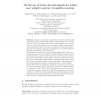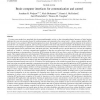6 search results - page 1 / 2 » On the Use of Brain Decoded Signals for Online User Adaptive... |
PERVASIVE
2010
Springer
13 years 11 months ago
2010
Springer
Activity and context recognition in pervasive and wearable computing ought to continuously adapt to changes typical of open-ended scenarios, such as changing users, sensor characte...
ICPR
2002
IEEE
14 years 5 months ago
2002
IEEE
We have developed a hand gesture recognition system, based on the shape analysis of static gestures, for Human Computer Interaction purposes. Our appearance-based recognition uses...
JUCS
2006
13 years 4 months ago
2006
We outline the Berlin Brain-Computer Interface (BBCI), a system which enables us to translate brain signals from movements or movement intentions into control commands. The main co...
CACM
2011
12 years 8 months ago
2011
For many years people have speculated that electroencephalographic activity or other electrophysiological measures of brain function might provide a new non-muscular channel for s...
ICANN
2009
Springer
13 years 2 months ago
2009
Springer
Mapping brain activity patterns in external actions has been studied in recent decades and is the base of a brain-computer interface. This type of interface is extremely useful for...


